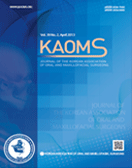Journal of the Korean Association of Oral and Maxillofacial Surgeons
- P-ISSN2234-7550
- E-ISSN2234-5930
- SCOPUS, KCI, ESCI
 ISSN : 2234-7550
ISSN : 2234-7550
Inferior alveolar nerve cutting; legal liability versus desired patient outcomes
이종호 (서울대학교)
Abstract
Objectives: Mandibular angle reduction or reduction genioplasty is a routine well-known facial contouring surgery that reduces the width of the lower face resulting in an oval shaped face. During the intraoral resection of the mandibular angle or chin using an oscillating saw, unexpected peripheral nerve damage including inferior alveolar nerve (IAN) damage could occur. This study analyzed cases of damaged IANs during facial contouring sur-gery, and asked what the basic standard of care in these medical litigation-involved cases should be.Materials and Methods: We retrospectively reviewed a total of 28 patients with IAN damage after mandibular contouring from August 2008 to July 2015. Most of the patients did not have an antipathy to medical staff because they wanted their faces to be ovoid shaped. We summarized three repre-sentative cases according to each patient’s perceptions and different operation procedures under the approvement by the Institutional Review Board of Seoul National University.Results: Most of the patients did not want to receive any further operations not due to fear of an operation but because of the changes in their facial appearance. Thus, their fear may be due to a desire for a better perfect outcome, and to avoid unsolicited patient complaints related litigation. Conclusion: This article analyzed representative IAN cutting cases that occurred during mandibular contouring esthetic surgery and evaluated a ques-tionnaire on the standard of care for the desired patient outcomes and the specialized surgeon’s position with respect to legal liability.
- keywords
- Facial contouring surgery, Legal liability, Less-than-perfect outcome of beauty, Unsolicited patient complaints, Medical malpractice
- 다운로드 수
- 조회수
- 0KCI 피인용수
- 0WOS 피인용수